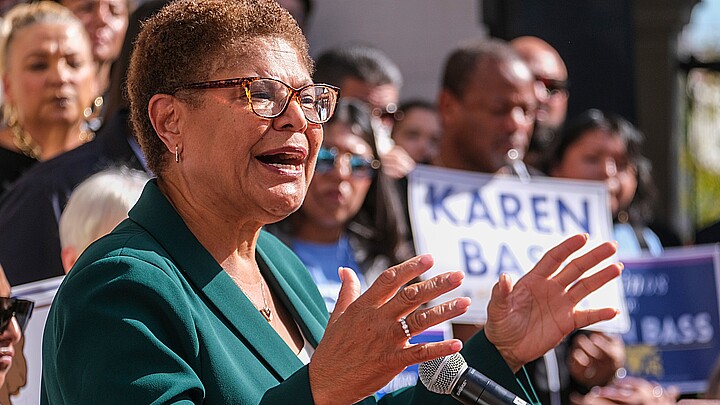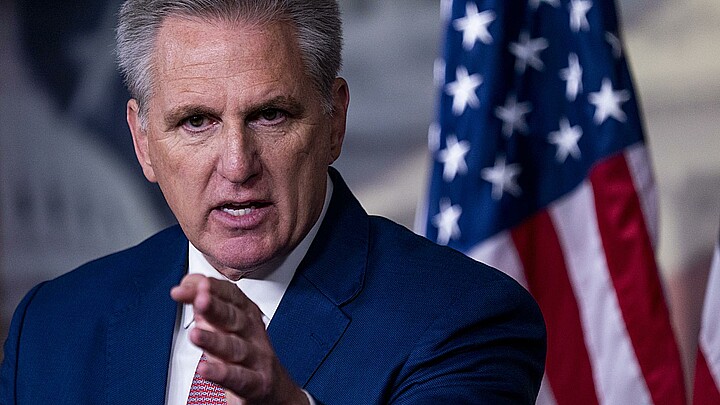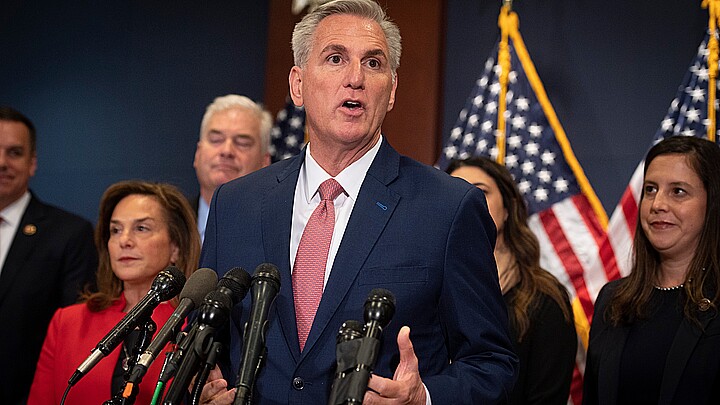Politics
Democratic congresswoman cries "foreign election interference" over tweets from Salvadoran president
Rep. Norma Torres is accusing El Salvador President Nayib Bukele for “foreign election interference” in her race, but the Salvadoran government says she did the same thing in 2021
November 30, 2022 9:06am
Updated: November 30, 2022 9:11am
A Democratic Latina congresswoman in California is accusing El Salvador President Nayib Bukele of engaging in “foreign election interference” in her race, apparently part of an ongoing a feud between the two that has been brewing since 2019.
Despite emerging victorious in her House race against a Republican challenger, Rep. Norma Torres published a scathing release shortly after the elections in response to a series of tweets from Bukele published last year calling upon Californians from the 35th district to vote against her.
“To our diaspora, Honduran and Guatemalan brothers and the entire Latino community: Let’s say no to Norma Torres, because she has done a lot of damage to El Salvador. Remember, no to Norma Torres,” one of a series of tweets read.
Torres, who is of Mexican ancestry accused her opponent of collaborating with Bukele, suggesting the tweets were an attack on Mexican-Americans and added that they violated human rights.
“They understand that whoever goes to Congress has an influence in American foreign policy,” he said. “I think the reality is that we’re going to be seeing a lot of this going forward, especially with large diaspora communities that have ties back home.”
“I am deeply disappointed by the campaign run by my opponent, who continued to traffic in moronic conspiracy theories, attacked hard-working Mexican-Americans, and accepted the outrageous endorsement of a foreign leader—someone who violates basic human rights and promotes hate, division, and racism against indigenous people on a daily basis,” she said in the release.
The district, which is nearly 70% Hispanic, has a large Mexican American population.
“Frankly, I am also disappointed in the lack of enforcement in our judicial system to address foreign interference in our elections,” she complained. “I was the subject of many threats, falsehoods, and harassment, both in-person and online. Many of the online attacks were orchestrated in El Salvador by President Nayib Bukele. He was aided in these efforts by his cabinet, members of his political party, and even by Consul Generals working in the U.S.
“They all promoted my opponent despite his well-documented history of espousing bigotry towards hard-working immigrants and Mexican families living in my district. This kind of flagrant manipulation of our electoral politics demands a strong response by the federal government to counteract misinformation, harassment, and lies directed by foreign governments to influence our democratic system.
Torres has also complained that the Salvadoran government has openly supported her Republican opponent in rallies and on social media, which she says resulted in stirring up animosity toward her during the election. The Latina congresswoman said she received threats and that she and her husband were harassed outside their house, so she began keeping a gun at her home last year. She blamed Bukele for the threats and called him a narcissistic dictator.
“This weapon stays very close to me when I’m home,” she said of her firearm during an interview.
Although the tweets do not rise to the level of the kinds of sophisticated election influence operations cited in the Mueller Report, which resulted in the indictment of more than a dozen Russian intelligence operatives, the U.S. Dept. of State suggested the tweets were an attempt to “directly influence certain electoral outcomes in the United States.”
“Throughout our last electoral process, we noted with alarm increasingly direct attempts by some Salvadorans to directly influence certain electoral outcomes in the United States,” a State Department spokesperson told NBC.
“As we have repeatedly made clear, this is unacceptable, and we have repeatedly communicated this directly to the Government of El Salvador through official diplomatic channels. The integrity of our elections is a vital part of our democratic processes; the will of the people must not be undermined by foreign influence,” the spokesperson said.
But Bukele’s officials had something to say about that—namely counter-accusing Torres of also engaging in election interference in their own country.
When NBC asked Salvadoran ambassador to the U.S. Milena Mayorga about the tweets, she said it was Torres who interfered in El Salvador by criticizing Bukele in Salvadoran press before the country’s February 2021 legislative elections. Torres disputes the allegation.
Mayorga also said that Torres promoted disinformation about Bukele before the country’s elections by saying he was rebuffed in an attempt to meet with President Joe Biden’s administration in Washington. Citing unnamed sources, The Associated Press reported thatJoe Biden rejected a request from Bukele to meet.
“We never asked for a meeting with the Biden administration,” Mayorga said, clarifying that Bukele made his visit to the U.S. to meet with the general secretary of the Organization of American States.
Bukele and Torres met once in 2019 when she was with a congressional delegation visiting El Salvador, and tension seems to have brewed ever since.
Like Torres, Bukele’s party Nuevas Ideas, or New Ideas also emerged victorious and neither candidate can complain that the so-called “interference” actually resulted in a negative outcome. Last year, Bukele’s party actually won the biggest congressional majority in the nation’s history.
Torres, who immigrated to the U.S. from Guatemala when she was five years old, and who was originally elected to Congress in 2015, also won with 57.4% of the vote. Her Republican opponent, Mike Cargile, only received 42.6% of the vote.
The Torres-Bukele feud is not the first time U.S. and Latin American leaders have expressed their opinions about transnational political issues.
In 2020, then senator Gustavo Petro, now the president of Colombia, said he wished he could vote for Biden and conservative Colombian senators endorsed Rep. Maria Elvira Salazar and then President Donald Trump on social media.
Former White House Chief Strategist Steve Bannon and presidential aide Stephen Miller are also now currently advising Brazilian president Jair Bolsanaro about the 2022 president elections.
Torres is the current chair of the Congressional Central America Caucus, which she co-founded her first year in Congress in 2015, and was relaunched in 2021.
The stated purpose of the Caucus is to function as a “bipartisan group of Members of Congress who are committed to learning about the region, monitoring U.S. foreign assistance, developing ideas for improving policy, and fostering the relationship between the United States and these nations,” a congressional statement reads.
“With the Biden administration’s recent focus on U.S. policy in the region, robust Congressional engagement is even more critical to ensure these funds are spent wisely and that the results are sustained.”










